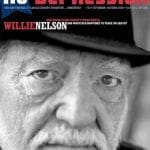Johnny Cash at Folsom Prison
Books chronicling the making of a single album have become a kind of subgenre recently, some of them tending toward overwrought think-pieces or snorefests of minutiae. There have been some worthy entries though, and Michael Streissguth’s account of Johnny Cash At Folsom Prison can go straight to the head of the class.
One of the inherent problems in reporting studio activities is the lack of drama. How much can you wring out of arguments and flubbed takes? Furthermore, researching previously published accounts and interviewing musicians decades after the fact requires a dependence on articles often filtered through publicists and the desire of aging participants to elevate their status or grind an axe.
In choosing to write about this pivotal work, Streissguth, already a Cash scholar (he edited Ring Of Fire: The Johnny Cash Reader), drew on not just the June 1968 concert, but also the drama historically attached to the prison. How often do you read about the recording of a concert with a passage like this: “As 9:40 approached, guards watched for knives, for fights. There was no reason to believe that at the Cash show a score wouldn’t be settled or some nut wouldn’t lunge at June or Johnny.”
No such problems occurred, and Cash had the audience of inmates in the palm of his hand. He joked, cajoled, made barbed remarks about guards and prison life, and casually but purposefully dropped in swear words (these were excised from the original LP but replaced on the recent expanded CD reissue).
The book’s narrative flow has a number of small, dramatic storylines, not the least of which is that of inmate Glen Sherley. He succeeded in getting his song “Greystone Chapel” to Cash, who performed it that day. Once out of prison, he joined Cash’s show until scuttled by his own numerous strands of unpredictable behavior. Ten years after the Folsom Prison concert, Sherley killed himself.
Cash’s label, Columbia, didn’t want him to make this album. Its success took them by surprise, particularly when the record was embraced by the era’s counterculture. It positioned Cash, with his concerns for the downtrodden, as a hero of sorts to the world beyond country music, albeit only for a brief time. At 36, he’d revived his career and forcefully fixed his persona in the mind of the public at large. This is the way we thought of him for the rest of his days: earthy, yet larger than life.




